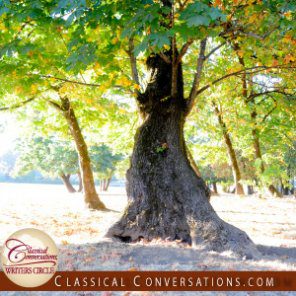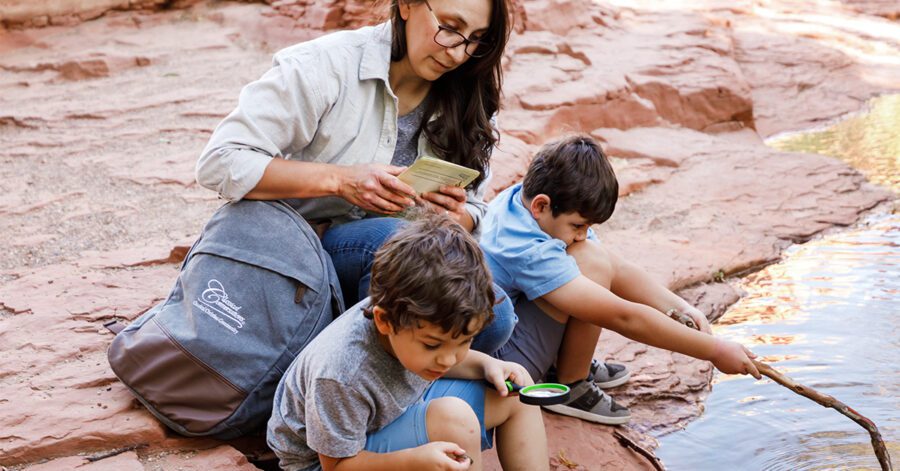“Mom, when am I ever going to get out of the grammar stage?” my eleven-year-old son asked me while reciting memory work. He wanted me to say, “When you turn twelve, you won’t have to do any more memory work,” but that is not entirely true. Although we say the grammar stage lasts until about age twelve, we will keep adding “grammar” the rest of our lives. The grammar stage is just the beginning of a lifetime of learning.
The Roots—Grammar—Soaking in Knowledge
Think of learning, I told him, as an oak tree. There are three things going on: First, the tree takes in lots of nutrients and water through its roots. This is like our brain absorbing lots of facts. God designed us to absorb millions of facts from the moment we are born. We are naturally wired to do enormous amounts of fact absorbing through age eleven. Classical educators call this stage the grammar stage, and they make the most of this time by encouraging children to soak in (memorize) many facts about science, geography, history, Latin, and English grammar. Dorothy Sayers, an essayist and friend of C. S. Lewis, called this stage the “Poll Parrot” stage. Leigh Bortins developed the Foundations program to help parents and children in this stage absorb lots of facts in the academic subjects and sharpen their skills of memorization.
The Trunk—Dialectic—Growing in Understanding
Secondly, the oak tree grows a trunk, branches, and leaves that put the nutrients to work. This is similar to how a student begins to put together, understand, and use the individual facts they have absorbed. We refer to this stage as the dialectic stage. Students in this stage use the facts in discussion and in processing new ideas. Classical educators make the most of this stage by focusing their studies on the relationships between facts and dialoguing with their students about the how and why of history and science and other subjects. We also want to teach clear reasoning and debate in this stage. Dorothy Sayers called this stage the “Pert” stage and recommended that if a child likes to argue, we should teach him or her to do it well. The general ages at which children are wired for being dialectic is from twelve to fourteen. This is the focus of Classical Conversations’ Essentials program and Challenges A and B.
The Fruit—Rhetoric—Bearing Fruit in Wisdom
Once the oak tree has developed good roots, stems, and leaves and has proper nourishment, it will begin to bear fruit (acorns). This is the third stage. A child who is given the nutrients of knowledge and develops the skills needed to process, understand, and apply those facts should be able to bear fruit in the form of original ideas and solutions to problems. They need to develop skills for communicating their ideas and solutions, of course, and they will need lots of practice. We teach the skills of public speaking and writing as early as possible; then, when they reach the age of fifteen and they have a desire to think deeply and originally, they have the skills to do so. Dorothy Sayers referred to this stage as the “Poetic” stage. Teenagers long to make an individual statement or “tell their own story.” My hope is that we can give our children tools to express themselves that can fulfill this heart-longing in a productive way—through essay, debate, discussion, public speaking, and becoming leaders.
“What about photosynthesis? Isn’t the tree getting energy from the sun through photosynthesis?” my son asked next. Another good question from my son, who was clearly trying to get out of memory work, but the analogy is so clear, I kept up my explanation. “A tree gets its energy from the sun,” I began, “just like we get our inspiration from the ‘Son,’ Jesus Christ.”
As classical, Christian educators, we want our students to soak in the love of Christ like an oak soaks up energy from the sun. We can do this by adding the love of Christ to the environment, incorporating it into our home and our studies. Classical Conversations tutors show students how Christ is revealed in every subject through math, Latin, science, and history. There is a constant seeking to know God in everything we study, and this is a valuable skill for every Christian. It is a transforming new way of thinking—seeking “Total Truth.”** We know from the Bible* that this will affect the fruit our students produce, so we need to keep this in mind throughout their education. We need to train our children to seek truth, beauty, and goodness.
Using the tree analogy, I helped my son see that an oak tree will keep absorbing nutrients its entire life in order to keep growing and bearing fruit. The roots go deeper and spread wider. In the same way, our children will continue to soak in knowledge throughout their lives. We spend the grammar stage teaching them the skills of memorization. Just as the oak tree adds layers to its structure every year, our students will add to their understanding. Finally, the oak tree will produce fruit, just as our children will be able to produce fruit in many forms—speaking, writing, and leading—no matter what career they choose. Hopefully, the soil they grow in is rich in the love of Christ so that their fruit is full of love, compassion, truth, beauty, and goodness.
And a mighty oak they will be.
* “Make a tree good and its fruit will be good, or make a tree bad and its fruit will be bad, for a tree is recognized by its fruit” Matthew 12:33 (NIV).
**See Nancy Pearcey’s book Total Truth for more information about seeking the Truth—Jesus—in every subject and every aspect of our life rather than separating religion from everything else, academic or otherwise.




